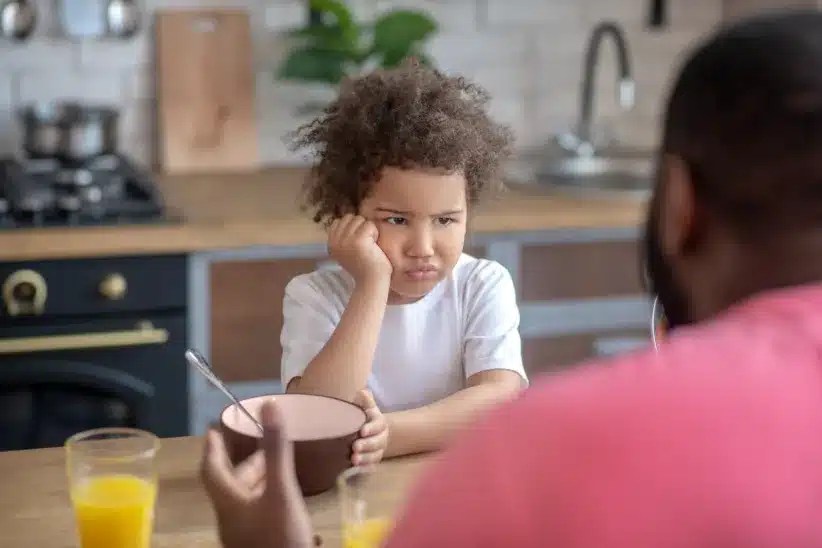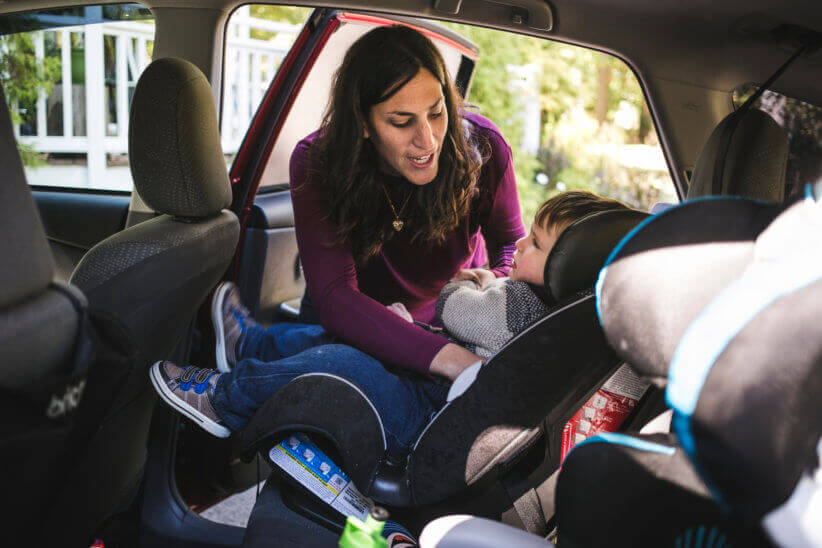I knew a mom several years ago who had a “no TV” policy. She was adamant about a television-free environment, so she didn’t own one. What she may not have known was that her son would visit his friends’ houses and make a beeline for the tube, instead of choosing to play soccer down at the park or go for a bike ride.
Television programming has changed immensely in the last 20 years. There are so many choices that it can make one dizzy at times. Part of the positive aspect of this change, however, is that there are plenty of quality choices available.
Perhaps the quandary for parents today is not if their children should watch TV but what they should watch and how often they should tune in. Parental controls as well as resource websites (i.e. www.commonsensemedia.org) provide parents with control and information that they didn’t have decades ago.
How much is too much?
Have you ever tried to have a conversation with a child engrossed in his favorite TV show? It’s like trying to get your dog’s attention when he’s just gotten a hold of his new, stuffed bone. He knows you’re there, but he’s too busy chomping to acknowledge you.
Balance is the operative word. Sometimes we all — parents included — need a bit of a break from the “real” world. It’s not unhealthy if quality television programs are viewed in moderation and are not interfering with social activities, school work, and family time.
“Television can be a source of learning and entertainment,” explains Dr. Sanam Hafeez, a licensed neuropsychologist and founder and director of Comprehensive Consultation Psychological Services, P.C. (www.comprehendthemind.com). “However, too much TV can take away from other activities, such as exercising, playing with friends, reading, and doing homework.”
Hafeez warns parents of additional concerns.
“Studies have shown that kids who watch too much TV are more likely to be overweight, and depending on the content of what they see, more aggressive. Excess TV viewing has also been linked to poor grades, sleep problems, and behavioral problems.”
Dr. Lisa Strohman, a clinical psychologist, co-author of “Unplug: Raising Kids in a Technology Addicted World” and founder of Technology Wellness Center (www.technologywellnesscenter.com), reports, “The American Academy of Pediatrics (AAP) recommends no television for children under the age of 2. For children older than 2, the recommendation is no more than one to two hours of quality programming a day. TV watching and technology use can impede valuable developmental activities like exploring, playing, and interacting with others. These functions are vital to learning and healthy physical and social development.”
Experts also remind parents that TV time includes watching programs on the computer and iPad.
Dr. Jephtha Tausig-Edwards, a New York City-based clinical psychologist and supervising psychologist for Family & Children’s Services of Nantucket, says, “Don’t have it playing in the background. Keep screens and other media out of children’s bedrooms and do not use right before bedtime. There really isn’t a substitute for reading to a child in terms of the boost this gives to early literacy and the opportunities for interaction between parents and children.”
If televisions are not in children’s bedrooms, the battle is half won, because it will be easier to monitor screen time if the television is in a central location used by all family members.
Quality programming
What should parents look for in quality programming?
“Look for educational content, respectful language, take-home messages or lessons which are congruent with your values, and what you feel are important perspectives you would like your children to have towards their fellow human beings,” says Tausig-Edwards.
“I’ve always recommended a rich diet of good, quality educational media that kids are interested in, want to talk about, and want to learn more from,” explains Angela Santomero, a child development expert, TV executive producer, and co-creator of the current hit, “Daniel Tiger’s Neighborhood” (PBS Kids) as well as “Blue’s Clues” (Nick Jr.) and “Super WHY!” (PBS Kids). She advocates television viewing in moderation: a good balanced diet of healthy media!
When it comes to preschoolers, Santomero counsels, “Interacting and physical touch is the most important stimulation for babies and toddlers. When television is introduced, it should be at a slower pace so that it is not overstimulating.
‘Daniel Tiger’s Neighborhood’ fits this bill because of its socio-emotional storylines, preschool musical strategies about sharing, going to the potty, dealing with disappointments, and trying new foods. These are life lessons that this young age group is able to grasp with musical strategies that help and guide both parents and kids together.”
“Go with calm, quiet programs. Slower-paced viewing gives small children time to think and absorb. Lots of random activity, like the kind in action-adventure cartoons, confuses them,” Hafeez describes. “Instead, choose simple programs that emphasize interactivity. Ideal shows inspire your child to make sounds, say words, sing, and dance.”
Santomero suggests the following shows for various age groups:
For preschoolers:
“Daniel Tiger’s Neighborhood” (PBS Kids: Socio-emotional)
“Creative Galaxy” (Amazo
“Super WHY!” (PBS Kids: Literacy)
“Blue’s Clues” (Nick Jr.: Kindergarten readiness show)
For young kids:
“Wild Kratts” (PBS & PBS Kids: Adventure learning)
“Wishenpoof!” (Amazo
“Word Girl” (PBS & PBS Kids: Literacy)
For tweens:
“Master Chef Jr.” (FOX: Cooking)
“Project Runway Jr.” (Lifetime: Fashion creation)
“The Amazing Race” (CBS and Travel Channel: Reality adventure)
“The Gilmore Girls” (Warner Bros. and Netflix: Family drama)
“Fuller House” (Sequel to “Full House.” Netflix Original Series: Family drama)
For teens:
“Downton Abbey” (PBS: Period drama series)
“Friends” (Reruns on TBS and NIK: Comedy drama)
Also recommended for teens:
“Scorpion” (CBS: Tech-driven drama series)
“Bunheads” (Freeform: Dance drama)
“The Fosters” (Freeform: Family about foster teens)
What to avoid
Santomero advises, “In terms of negative programming, I always say that turning on any media is like opening the door to your living room. Would you let kids in who were being violent, mean to each other, or making fun of other kids? Depending on the age of your child, the immersive experience of media creates an image that can hardly ever be erased, so be careful of what stories you decide to have your kids be part of and what characters you want your kids to be friends with. Also, be ready to talk about any and all issues that they see.”
Experts have studied the effects of violent and sexual content affecting young viewers’ behavior for decades.
Tausig-Edwards points to Albert Bandura’s seminal work in this area.
“The work showed that children are affected by instrumental violence. For example, if they see it, they are likely to try it subsequently. Content is crucial as children are not able to differentiate between real and cartoon violence until they are much older.”
Hafeez agrees.
“Younger children tend to model behavior they see and don’t always understand the difference between reality and entertainment. Therefore, exposure to sex and violence through the media’s influence can cause aggressive or anti-social behavior. Media can influence children to believe violence is a good solution to solve problems or desensitize and cause a lack of empathy for human suffering.”
In terms of the consequences of being exposed to sex and violence on television, Dr. Hafeez states, “Kids exposed to sex on TV are almost twice as likely to initiate sexual intercourse. Some research suggests that kids who watch violence on TV are more likely to display aggressive behavior.” For young children, she suggests that scary shows be avoided as well.
Santomero adds, “Watching violence on television is not only a modeling concern for kids, but might also motivate kids to be more violent in nature. Watching sexual content, before [one is] ready, could cause confusion or lack of understanding about what a positive relationship can and should be.”
Some general guidelines
Overall, I believe in watching age-appropriate content that is enriching and inspiring,” says Santomero. “I also believe that, as a parent, you are doing your best when you are interested, active, and involved in what your kids are doing. Get into the content that they are watching as deeply as possible. Read the books, play the app, do related activities, or just sit over a snack and have a good old-fashioned discussion about your child’s favorite show.”
Hafeez advocates critical viewing.
“Even young children can learn to watch without ‘tuning out.’ Encourage your child to ask questions and relate what’s happening in the show to her own life. For example, if you and your toddler have just finished watching a ‘Sesame Street’ segment that introduces a number, talk about it later and find other examples to show him. While setting the table you might say, ‘Hey, today’s number was 3, and there are 3 places to set!’ ”
All experts advise encouraging social activities that draw kids away from obsessing about what’s on the screen.
Myrna Beth Haskell is an award-winning author, columnist, and feature writer. Her work has appeared in national and regional publications across the U.S. as well as internationally (www.myrna





















